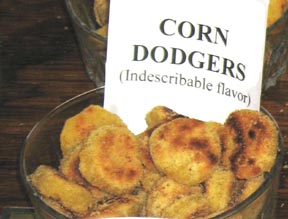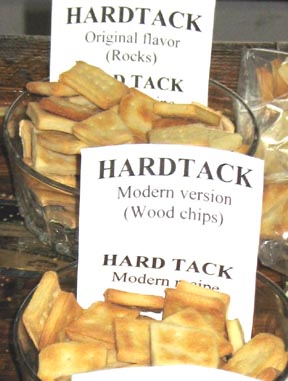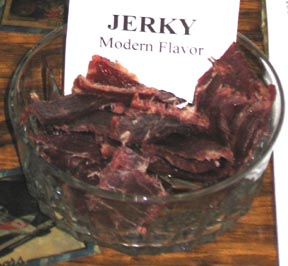
Tired of freeze-dried? How about some hardtrack and corn dodgers for a tasty change of pace.
By Buck Tilton, BACKPACKER Contributing Editor, September 2000
The one time I went backpacking with my friend Chris, I found out what it's like to go the "all-natural way," as he calls it. He wears wool, sleeps on a sheepskin after wrapping himself in a wool blanket, and cooks in a black iron pot on open flames. "All natural," I found out, also applies to his cotton food bag with rawhide drawstring: the contents include cornmeal and flour, beans and dried meat, maybe a few raisins. Chris likes to experience the backcountry much like the grisly mountain men did in the early 1800s. In those days of yore, there was a lot of truly wild and rugged land to wander through, and wilderness adventures lasted for many months, even years. The original outdoorsmen saw food as fuel, rather than as an epicurean delight. Not that the first "backpackers"--the ranks included Native Americans, explorers, soldiers, pioneers, cowboys, as well as trappers--despised a tasty meal. Just the opposite, I reckon. Those who spent most of their days outdoors learned to whip up a culinary delight or two from some seriously basic foodstuffs, like dried beans and meat (satisfied the protein needs), plus flour, various forms of oats and grains, and cornmeal. Dried fruit, sugar, pepper, salt, and fat straight from the carcass of a fresh kill also figured into the daily menu, and all in all, these travelers managed to maintain a balanced, albeit predictable, diet that kept them relatively healthy.
Since that excursion with Chris, I've been intrigued by the prospect of making dinner from similarly slim pickins and have experimented with recipes gleaned from the pages of history. The resulting foods offer interesting variations on the traditional trail diet, not to mention edibles that'll outlast your favorite pair of boots.

Serves: 8
Cornmeal packed small and light, making it the favored way for pioneers to lug the yellow grain cross-country. Johnnycakes, or hoecakes, were baked yummies of cornmeal mixed with a dollop of bear grease or lard. My personal favorites, corn dodgers, are easy to make on the trail and were eaten by many a U.S. infantry man.
At Home: Combine the dry ingredients in a zipper-lock bag.
In Camp: Soften the butter and stir into dry mixture. Add milk. Form into "dodgers," flat, thin patties or tiny bullet-shaped loaves. Fry in a pan of hot oil until both sides are brown. Yield: 20 2-inch dodgers.
Calories: 63 Carbohydrates: 10.6 Cholesterol: 3.4 Dietary Fiber : 1.9 Fiber: 2.1 Protein: 1.8 Saturated Fat: .8 Sodium: 114 Total Fat: 1.6
Serves: 8
Cornmeal packed small and light, making it the favored way for pioneers to lug the yellow grain cross-country. Johnnycakes, or hoecakes, were baked yummies of cornmeal mixed with a dollop of bear grease or lard. My personal favorites, corn dodgers, are easy to make on the trail and were eaten by many a U.S. infantry man.

Serves: 12
It was hard and it was hardy. Union soldiers supposedly marched toward the South in 1861 with hardtack leftover from the War of 1812. These crackers, wrote one Civil War correspondent, were "hard as bricks and indestructibly unappetizing." The newer version is surprisingly good, but still hard as a brick.
At Home: Mix the ingredients into a dough and roll out to a thickness of about 1/2 inch. Cut into squares. Prick the squares with a fork or knife. Place them on a lightly greased baking pan and bake at 400 degrees F for 20 to 30 minutes, until golden brown. Yield: 24 2 x 2-inch bars.
Calories: 101 Carbohydrates: 15.9 Cholesterol: 2.8 Dietary Fiber : .5 Fiber: .6 Protein: 2.5 Saturated Fat: 1.2 Sodium: 141 Total Fat: 2.8
Serves: 12
It was hard and it was hardy. Union soldiers supposedly marched toward the South in 1861 with hardtack leftover from the War of 1812. These crackers, wrote one Civil War correspondent, were "hard as bricks and indestructibly unappetizing." The newer version is surprisingly good, but still hard as a brick.

Serves: 6
No one knows exactly when it was discovered that you can dry meat and store it for later consumption but for centuries, the recipe has remained unchanged: Slice up the meat and hang it until all the water evaporates.
At Home: Partially freeze the meat so it's easier to slice into strips no more than 1/2-inch thick. Trim away fat. Mix the Worcestershire and soy sauces with the garlic in a dish. Rub the meat with a little salt and pepper and place it in the marinade. Refrigerate the marinating meat for at least 24 hours. Pat the meat dry and place it in a dehydrator or oven for 7 to 8 hours, until it's dry yet pliable. For oven drying, evenly space the meat on the rack and spread foil beneath it to catch the drips. Set the oven to 150°F, and leave the oven door open slightly for better circulation.
Calories: 57 Carbohydrates: 1.1 Cholesterol: 15 Dietary Fiber : .010 Fat: 3 Fiber: .025 Protein: 5.9 Saturated Fat: 1.2 Sodium: 381
Serves: 6
No one knows exactly when it was discovered that you can dry meat and store it for later consumption but for centuries, the recipe has remained unchanged: Slice up the meat and hang it until all the water evaporates.